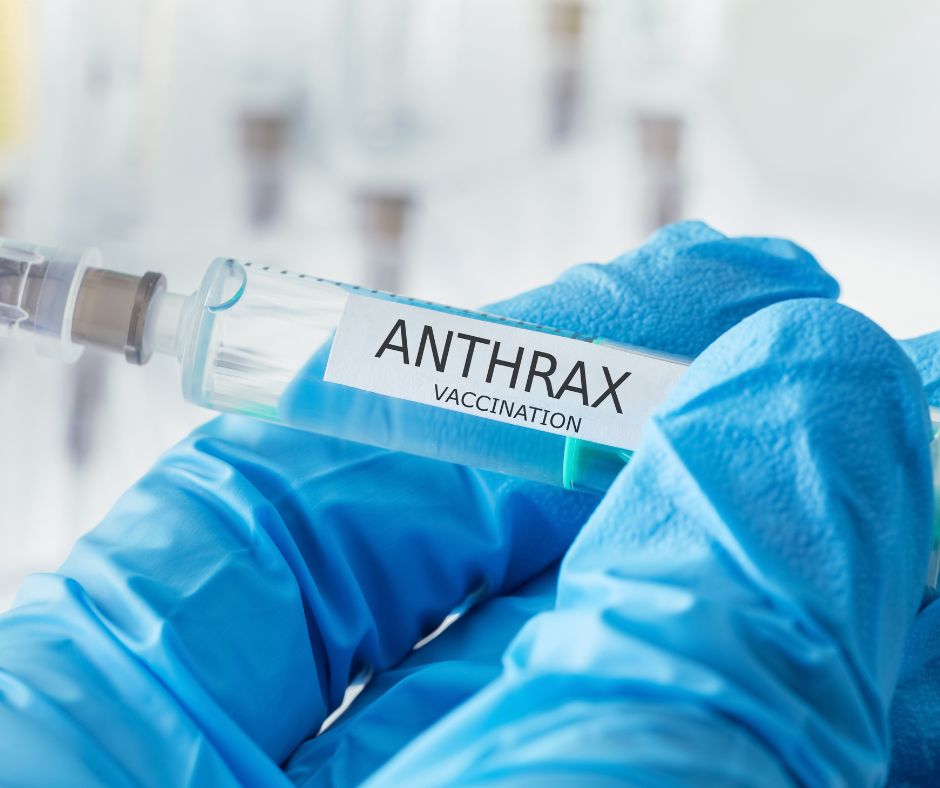The U.S. Food and Drug Administration (FDA) last week fully approved a second-generation anthrax vaccine meant to treat adults ages 18 to 65 only after anthrax exposure, even though it must be administered together with other antibacterial drugs. The two-dose vaccine is called Cyfendus, and its ingredient list contains known toxic substances such as aluminum, formaldehyde, and benzethonium chloride, and may cause serious side effects according to the vaccine’s package insert.
The ingredient list also names CPG 7909, a largely unexplained synthetic DNA molecule. Except for this synthetic ingredient, Cyfendus contains the same ingredients as its predecessor Biothrax, which was FDA approved in 2016 and is meant to be taken before anthrax exposure.
Dr. Meryl Nass, an internist, biological warfare epidemiologist, and anthrax expert, questioned the purpose of the vaccine. She stated individuals exposed to anthrax need immediate treatment, yet the Cyfendus vaccine, meant to be taken after exposure, can take weeks to months to take effect.
“The FDA admits it does not work because you are required to take antibiotics with it—and it is the antibiotics that actually kill anthrax after an acute exposure.”
Since Cyfendus requires antibacterial drugs to be taken in tandem, Nass noted that she could not identify any new health benefit from this vaccine, especially due to the ingredient list.
The vaccine’s insert states that Cyfendus uses aluminum hydroxide and the synthetic DNA ingredient as adjuvants. According to the study, “Emerging Concepts in the Science of Vaccine Adjuvants,” published in the National Library of Medicine, adjuvants are added to vaccines to stimulate the immune system to respond to the vaccines. The study further states adjuvants derived from alum have been in use since the 1920s and “have been incorporated into billions of doses of vaccines and administered to millions of people every year.”
However, peer-reviewed studies also published in the National Library of Medicine show aluminum adjuvants are known neuro toxins associated with adverse effects. Specifically, the 2007 study, “Aluminum Adjuvant Linked to Gulf War Illness Induces Motor Neuron Death in Mice,” states that the aluminum adjuvant is linked to a “spectrum of disorders” known as Gulf War Illness (GWI), which includes fatigue, muscle aches and joint pains, emotional disorders, posttraumatic stress reactions, headaches, and memory loss.”
Other research has also found a strong link between aluminum exposure and Alzheimer’s disease and autism.
As for Cyfendus’ other ingredients, formaldehyde is a flammable chemical known to cause rare cancers, and benzethonium chloride is an ammonium compound used as a disinfectant in detergents and soap and is toxic if ingested. Both ingredients are used in this vaccine as preservatives.
Regarding the synthetic DNA molecule, the insert only discloses that it is an adjuvant.
Due to few real-world cases of anthrax, Cyfendus’ efficacy was only studied in animals. The insert stated that the two-dose treatment on rabbits demonstrated a “70% probability of survival” after eight weeks. In addition to the animal trials, four clinical human trials evaluated Cyfendus’ safety. While long-term effects, if any, are yet to be identified, these trials observed participants for at least 12 months finding 84 percent of them had a systemic reaction, including tiredness, pain, and headaches. Eight percent refused a second shot. The insert further noted that previous studies of Biothrax caused birth defects after being given to pregnant women. The insert stated, “Of the 11 pregnancies (one twin pregnancy), one (9.1 percent) resulted in miscarriage and there were two infants (18.2 percent) born with major birth defects.”
Dr. Nass noted the shot is essentially the older Biothrax vaccine with a “novel adjuvant” added and “cannot possibly be safer” than the older vaccine.
The vaccine’s manufacturer, Emergent BioSolutions, a multi-billion-dollar biopharmaceutical company with many government and defense contracts, stated the vaccine has been in development for nearly 20 years in collaboration with the Defense Advanced Research Projects Agency (DARPA), the Biomedical Advanced Research and Development Authority (BARDA), and the National Institute of Allergy and Infectious Diseases (NIAID). The new vaccine is part of Emergent’s portfolio of anthrax-related products, which includes Biothrax. In 2019, the FDA authorized Cyfendus for emergency use.
According to the FDA, the federal government has purchased both Biothrax and Cyfendus for the Strategic National Stockpile (SNS) to be used in the event of a terrorist attack involving anthrax. A five-year deal from 2011 to 2016 for Biothrax was reportedly worth $1.25 billion for 44.7 million doses. An additional deal between Emergent BioSolutions and the Center for Disease Control and Prevention for $911 million added 29.4 million additional doses to the SNS.
Liberty Counsel Founder and Chairman Mat Staver said, “The anthrax vaccine has a sordid history involving questionable approvals, illegal vaccinations of our military personnel, and devastating side effects. The FDA has a terrible track record of approving harmful drugs, and they are now repeating the mistakes of the past approving yet another dangerous vaccine. The FDA needs a blanket overhaul.”
















